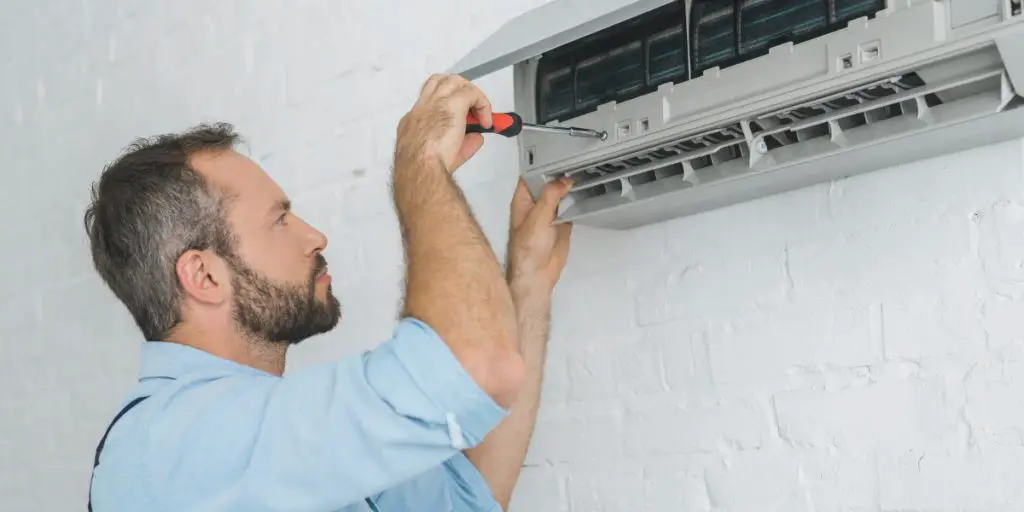You may need to cast your mind back a little bit, but do you remember the lovely hot weather we had last summer? The rising summer temperatures have many Brits questioning whether they should install air conditioning units in their homes. But why are UK homes built without air conditioning? When you imagine British weather, you may think of grey skies and muddy puddles, but things are changing.
UK houses don’t have air conditioning because they are designed to stay warm. The United Kingdom famously has cool, wet weather year-round. The country spends most of the year trying to keep its homes warm instead of cool.
Many factors are now turning the tables on whether air conditioning is necessary for British homes. This guide will explore why the UK does not have residential air conditioning and why more homeowners are now installing AC.
Reasons Why UK Homes Do Not Have AC
UK houses are designed around a central heating system. Development companies and builders have always built homes to retain heat and combat the cool, damp weather. Recent weather events have caused many homeowners to take the plunge and install an air conditioning unit.
Water-based heating systems are another prevalent reason British homes do not feature AC. A 2021 report from the Department for Business, Energy, and Industrial Strategy revealed that less than 5% of homes in the UK have air conditioning. However, the installation process is simple with the assistance of a qualified engineer.

Should British Homes Install Air Conditioning?
Climate specialists insist that Britain is no longer a cold country, and its inhabitants must learn to deal with warmer weather. Climate change is altering the average temperature in the UK and reducing the severity of cold weather. Installing air conditioning will help residents stay cool and healthy as the temperatures climb.
“As the climate warms, our winters in the UK are becoming warmer on average, which is already leading to a reduction of cold extremes,” explains Professor Lizzie Kendon, Climate Scientist at the Met Office.
The best way to avoid heat-related illness or death is to install an air conditioning unit in your home. There are many benefits to having an air conditioning unit in your UK home, including increased property value.
How Does AC Installation Affect House Prices?
Air conditioning is considered a luxury in the United Kingdom. You could see a significant return on investment if you install air conditioning before selling your home. A home worth £250,000 could increase in value by £6,250 when fitted with an AC system.
Installing air conditioning is worthwhile if you want to make money from your property and make it more desirable to buyers. Wall-mounted units are the most cost-effective options for homeowners wishing to improve their property’s value.
Where Can You Find Air Conditioning in the UK?
Many businesses and public areas have invested in air conditioning in recent years to keep their customers cool and comfortable. Some of the commercial places you will find AC in the UK are:
- Restaurants
- Supermarkets
- Shopping centres
- Leisure centres and gyms
Despite the low demand for home air conditioning units, several well-established air conditioning businesses are in the UK. Towns and cities with large populations are more likely to have venues with air conditioning.
What Are the Different Types of Air Conditioning?
There are four main types of home air conditioning units you should know about. Central air conditioning, portable air conditioning, split unit, and multi-split air conditioning are all UK-specific AC units. There are other options for commercial and industrial use if you need air conditioning for your business.
Portable Air Conditioning
Standalone air conditioners are perfect for office spaces or small rooms. 1 in 7 adults worked from their UK home in 2022. Portable air conditioners are an excellent choice if you are on a budget and want to avoid installation fees. Of course, during the Covid years, this figure was probably higher with more people having to work from home.
A portable AC unit is also useful if you need to move it around the room with you as you work. Portable units can cost as little as £500 and are a great option for keeping cool in the summer. However, portable AC units are not permanent and will not add value to your property.
Central Air Conditioning
Central air conditioning uses a series of ducts and vents to transport cool air around a building. These systems are more subtle and do not require large visible fittings inside the home. Although central AC is less noticeable, it does not provide flexible temperature control.
Split and Multi Split Unit AC
Split air conditioning systems consist of an indoor and outdoor unit. They are static units installed in one room using refrigeration pipes that deliver cooled air to the property. Multi-split air conditioning systems are similar and contain several units that cool multiple rooms.
Split and multi-split systems are quieter and more efficient than portable AC units. The external component can be large and noisy but does not often affect the property’s inhabitants.
How Much Does Air Conditioning Cost in the UK?
The average price for a home air conditioning unit in the UK is between £1,000 and £3,000. The air conditioning unit’s cost depends on the room’s size. Ducted air conditioning systems cost more than split air conditioner systems.
Factors for determining installation costs include the following:
- Size and type of AC system
- Room size
- System features
The installation process can take up to 8 hours, depending on the size and complexity of your chosen air conditioning system. The cost of running air conditioning in the UK varies depending on the size and quality of your system. The average cost of running air conditioning in the UK is £3,262 per year.
You can reduce annual running costs by conducting regular maintenance and cleaning your air conditioning system. Older units will cost more than modern systems that receive regular servicing. An air conditioning installation professional will advise the best product and estimate your property’s running costs.

Benefits of Air Conditioning in the UK
Installing an air conditioning system in your home provides more than a stable temperature year-round. Having an AC system in a British home can also benefit your health. Remote workers, elderly residents, and disabled homeowners can all benefit from installing an AC unit in one or more residential rooms.
Some of the notable benefits of a home AC unit include the following:
- Reduced pollution and odours
- Relief from seasonal allergies
- Maintaining a consistent temperature throughout the home
- Regulated humidity levels
An air conditioning unit can also help you get a better night’s sleep. Maintaining a constant temperature throughout the night will keep you cool and comfortable while you rest. Getting quality sleep with minimal disruptions will improve your overall health and well-being.
Can Air Conditioning Relieve Allergy Symptoms?
Hayfever (also known as seasonal allergic rhinitis) is one of the most common allergic conditions in the United Kingdom. The NHS estimates that there are over 10 million people with hay fever in England. Installing an air conditioning unit in your home could relieve symptoms and make summertime more comfortable by helping you control the air that circulates your home.
The Met Office warns that higher temperatures and heavier rainfall could lengthen the UK pollen season and increase pollen concentrations.
Many allergy sufferers will stay at home when their symptoms worsen. Indoor air quality can often exacerbate allergy symptoms due to poor ventilation, pets, and dust. Keeping windows and doors closed can reduce outdoor air pollution entering the home, but it can make indoor air quality poor.
Most air pollutants are water soluble, so an air conditioning unit can remove them from your home. AC units draw moisture from the air along with dust particles, pollen, and other pollutants. Allergy sufferers in the UK could benefit from installing air conditioning and improving the air quality in their homes.
Air conditioning systems also remove excess moisture and humidity, which causes mould and mildew in the home. Removing water and bacteria will promote a healthier indoor environment that will alleviate allergy symptoms and maintain a comfortable temperature.
Are HEPA Filters Effective for Allergies?
HEPA (High-Efficiency Particulate Air) filters are fitted inside domestic air conditioning systems to capture almost all particles and improve air quality. HEPA filters adhere to strict guidelines, which means they remove 99.95% of particles. They can also be used in vacuum cleaners to reduce the number of airborne pathogens released into the air.
The best way to purify air at home is by adding a HEPA filter to your air conditioning system. A HEPA filter benefits residents in built-up areas with high traffic and pollution levels. The filters can be placed inside ducts or on air conditioning units to prevent smoke, viruses, and pollen from entering the home.
Can Air Conditioning Units Heat UK Homes?
Most air conditioning units are capable of heating your property as well as cooling it. There are many benefits to using your AC unit as a heater, including no unsightly radiators and reduced energy bills.
Using an air conditioning system to heat your home is also a more energy-efficient heating method. With the right system in place, you could save money on your energy bills and improve the comfort of your home.
A multi-split unit air conditioning system can keep a consistent temperature throughout several rooms by maintaining an even distribution of heat throughout the property. The AC unit produces heat by reversing the cycle of the system and taking heat from outside to alter the temperature indoors.
Is Air Conditioning Common in UK Workplaces?
Air conditioning systems are more common in workplaces than in homes in the United Kingdom. A national study of 2,000 UK adults conducted on behalf of Aspect revealed that workplaces are too cold for women and too hot for men. Installing air conditioning is a high priority for businesses that want to keep their workforce comfortable and productive.
Although employers are not legally obligated to provide air conditioning, there is a growing demand for AC in the workplace in Britain. There is no maximum working temperature for employees in the UK, but employers are urged to reduce heat stress and exhaustion with air con and workplace adjustments.
Things To Consider Before Installing Air Conditioning
The last thing you want to deal with is the wrong type of air conditioning unit in your home. Some units can be noisy and unproductive if placed in the wrong spot.
Conducting thorough research before you buy an air conditioning unit is essential. You must factor in the cost and effort it will take to install AC in your home. It is helpful to collect quotes from several tradespeople and property experts to get the best price for the job.
Some of the main points to consider before installing AC include the following:
- Affordability
- Energy consumption
- Building type
- Number of rooms that need cooling
Owners of listed buildings must install an air conditioning unit that causes minimal disruption. Property owners must obtain listed building consent (LBC) on many occasions before completing installation. You must liaise with a trusted, knowledgeable air conditioning company that can provide a considerate solution.
Is Air Conditioning Right for You?
It would be helpful to consider your needs before researching air conditioning units for your property. Installing AC in Grade II listed buildings can be challenging without planning permission. Think about what type of air conditioning system is suitable for your building size and shape so you can find the best solution for your needs.
Heat waves are increasing the demand for air conditioning, so it may be a good time to think about installing a system on your UK property. Not only could it increase the value, but having AC could improve the air quality and reduce indoor pollution. If you have allergies or are sensitive to heat, installing AC is a good idea.
Key Takeaway
UK houses have focused on heating rather than cooling for centuries. The United Kingdom does not experience enough heat to warrant air conditioning inside homes. The main reasons why UK houses do not have air conditioning include the following:
- Cool temperatures require year-round heating.
- Short summers
- Homes are designed for damp, mild weather.
Many homeowners are reconsidering air conditioning as summer temperatures become unbearable without a cooling system.
Sources
- Midland Air Con: Can Using Air Con to Heat My Home Save Money?
- Cool You Direct: Internal Air Conditioning Helps Allergies
- Airway Group: The Rules Around Temperature in the Workplace
- Lee Jackson Air Conditioning: Air Conditioning Solutions for Listed Buildings
- Smart Air Filters: What Are HEPA Filters and How Do They Work?
- National Jewish Health: HEPA Filters
- Maximum Climate Control: Reduce Air Conditioning Costs
- Efficient Cool Heat: Air Conditioning More Efficient Than Heaters
- Puravent: Air Conditioning Types
- Newair: Which Air Conditioner Is Best For Me
- Is It Bad To Buy a Flat Instead of Renting? - February 20, 2023
- If You Buy a UK House at Auction, When Do You Pay? - February 15, 2023
- Why Are Houses in the UK So Overpriced? - February 7, 2023


